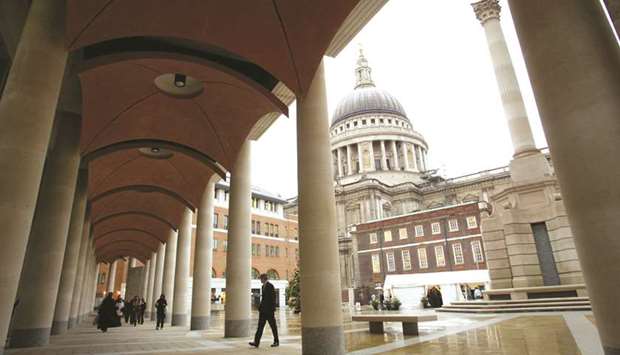World stock markets inched cautiously forwards yesterday as European traders mulled Britain’s increasingly acrimonious war dance with the EU.
The Dow ticked up a 0.6% gain but the tech heavy Nasdaq was flat more than two hours into the session while European indices stayed largely put.
After increasingly tetchy sparring between Britain and the European Union raised the prospect they will not reach a post-Brexit trade agreement London’s benchmark FTSE 100 barely dragged itself into positive territory.
A recent rout in US stock markets had also extended to local equities, pressuring the FTSE 100 in particular.
On the plus side for British industry, a stuttering sterling — which hauled itself off multi-month midweek lows — has been helping to boost share prices of the index’s multinationals earning in dollars while there was some cheer after it emerged a trade deal has been agreed with Japan.
But on the minus side, with the virus ‘R’ transmission rate rising again, the second city of Birmingham announced new coronavirus restrictions.
Regarding relations between Brussels and London, “I wouldn’t be surprised that after huffing and puffing, one of the two parties blink and agree to some compromise in the coming weeks.
The pound could strengthen sharply if investors realise they have overreacted to this week’s events, said Fawad Razaqzada of ThinkMarkets.
After Thursday’s sterling selloff, the British unit was stable at $1.2802 to the dollar amid news the UK economy expanded 6.6% — albeit still well off pre-coronavirus levels.
“Ultimately UK investors will probably thank the UK government for pushing down sterling and allowing the FTSE the room to recover 6000 (points,” said Chris Beauchamp, chief market analyst at IG.
“Given time, however, we can expect the index to return to its dismal ways, as the global investing community picks the more solid performers on Wall Street over an increasingly fraught UK outlook.”
Britain earlier said it had secured its first major post-Brexit trade agreement — a free trade deal with Japan worth £15.2bn ($19.5bn, 16.5bn euros) — amid its bitter wranglings with the European Union.
Taking a transatlantic view, David Madden of CMC Markets said “traders are still monitoring the health crisis.
Uncertainty in relation to the UK-EU trade relationship has increased and US lawmakers have yet to reach an agreement” on a $500bn relief package which failed to pass the Senate, making a second round of much needed help for Americans unlikely any time soon.
The proposed amount was half of what Republicans had previously pushed for, and a quarter of the Democrats’ plan.
Elsewhere, European stock market operator Euronext is in negotiations with the London Stock Exchange Group to buy the Milan stock market, the companies announced yesterday, while Deutsche Boerse added it is also a bidder.
LSEG is prepared to sell the Milan exchange to win approval by the EU Commission of its planned purchase of US financial data provider Refinitiv.
Euronext operates the exchanges of Amsterdam, Brussels, Dublin, Lisbon, Oslo and Paris.
The blue-chip FTSE 100 closed the day 0.5% higher and added 4% for the week, breaking a three-week losing streak.
Insurer Aviva was the best performing blue-chip for the week after it said it will sell its Singapore business for S$2.7bn ($1.98bn).
The mid-cap FTSE 250 shed 0.1% and lagged its bluechip peers for the week as a spike in Covid-19 cases spurred new curbs on social activity, hurting domestically-inclined consumer stocks.
Pub operator J D Wetherspoon was the worst weekly performer on the index.”The FTSE 100 has international horizons and the resulting weakness in the pound (from hard Brexit fears) has boosted the relative value of constituents’ overseas earnings,” said AJ Bell investment director Russ Mould.
Rio Tinto was the biggest boost to the index for the day after giving in to shareholder pressure to replace its chief executive over the destruction of two significant Aboriginal rockshelters.
Major miners rose on weakness in the pound and higher metal prices.
The pound has come under pressure from increasing bets on a no-deal British exit from the European Union.
Still, British stocks have lagged their peers in the developed world as middling economic data and an uptrend in local coronavirus cases pushed them into a tight trading range since May.
British Airways owner IAG was the worst performing blue-chip stock for the week after it launched a heavily discounted capital raising and flagged worsening outlook for the rest of the year and 2021 due to the pandemic.
While data yesterday showed Britain’s economy in July grew for a third consecutive month, the new curbs on activity are likely to weigh on growth.
In London, the FTSE 100 closed up 0.5% to 6,032.09 points; Frankfurt — DAX 30 ended down 0.1% to 13,202.84 points; Paris — CAC 40 closed up 0.2% to 5,0346.14 points and EURO STOXX 50 closed up 0.2% to 3,320.37 points yesterday.

The walkway seen outside the London Stock Exchange building in Paternoster Square. The FTSE 100 closed up 0.5% to 6,032.09 points yesterday.
